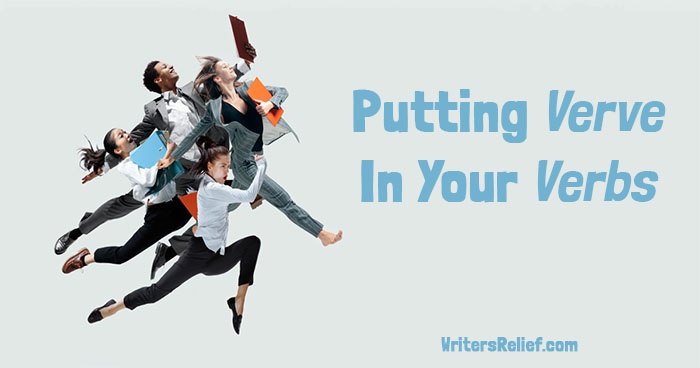
Updated October 2023
Those of us who spend much of our time hunching over keyboards or reading books in armchairs aren’t exactly known for being the washboard-abs crowd. But even if we suffer from too much “butt-in-chair” time, we writers can tone and shape our writing for maximum impact by kick-starting our verbs.
The verbs we use in our normal, everyday conversations aren’t always the best verbs to use when we’re writing. When we’re talking we can use our hands, our tone of voice, and our facial expressions to get our point across, and so we can settle for verb choices that are wimpy and flat. For example:
He ran through the crowd.
I didn’t like my mochaccino.
These phrases might come off as emphatic when they’re uttered in conversation. But when text is our medium, the primary way we can emphasize the tone of the words is by making stronger word choices.
He sprinted through the crowd.
I hated my mochaccino.
Sometimes amping up a verb requires restructuring a sentence.
He darted among the pedestrians.
My mochaccino nauseated me.
And other times the verb choice will need to reflect a character’s dialect or personality.
He bullied his way through the crowd.
I’m not feeling my mochaccino.
But, whatever the case, the verb is often the driving force behind the momentum of a sentence, so it’s important to choose wisely.
One other “problem area” to work on when you’re ramping up your verb choices is the dreaded adverb. Overusing adverbs is the equivalent of trying to do crunches by pushing yourself up with your hands—it’s a way of “helping” the main action, but it makes the results less dramatic. Sometimes adverbs are absolutely necessary, but when you can get rid of them, you should.
Compare:
I went quickly through the crowd.
I zipped through the crowd.
I didn’t completely appreciate my mochaccino.
I dumped out my mochaccino.
As you can see, the main idea behind each of the above examples—the subtext—changes subtly from one sentence to the next. It’s these subtle shadings and nuances that make the difference between writing that’s muscular and writing that’s flabby.
Unfortunately, there is a danger of getting a little too carried away with colorful verb choices. It’s tempting to overinflate the action for dramatic effect or because the verb in question “sounds cool.” But that can make the action feel forced or artificial. And when the style of language is not consistent, when one verb screams “exceptional” within a whole paragraph of “normal” verbs, the effect is like looking at a body builder who has never exercised anything but his biceps—kind of distracting.
We recommend that writers exercise their verb use in order to increase strength and flexibility but all in moderation. After all, even if we armchair athletes can’t be powerful and vigorous, at least our verbs can be!



















Great insight. Thanks
Thank you for the verb warnings. I am never at a loss for a good verb. But….we all need to be alerted to continue to be mindful of just what we are writing. This is a great reminder to continue to be creative and watchful!
Thanks for the reminder to the writer’s awareness!
Amazing!
Thanks for this article. A great aid for aspiring writers like me. Hope you can come up with more helpful tips.